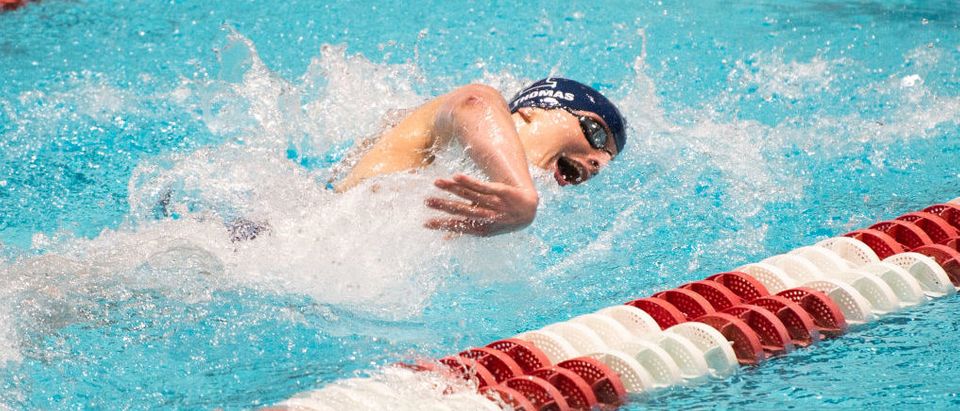A Virginia Tech swimmer who was unable to compete in the finals of the 500-yard freestyle at the NCAA Championships criticized the NCAA rules allowing transgender athletes to compete against biological females, claiming the rules allowed Lia Thomas to dominate the competition.
Reka Gyorgy finished in 17th place and missed the cut off for the 500 freestyle. In a letter originally posted to her private Instagram account but later re-shared on social media, Gyorgy slammed the NCAA rules as “disrespectful.”
“With all due respect, I would like to address something that is a problem in our sport right now and hurting athletes, especially female swimmers,” Gyorgy wrote. “Everyone has heard and known about transgender, Lia Thomas, and her case including all the issues and concerns that her situation brought into our sport.”
“I’d like to point out that I respect and fully stand with Lia Thomas; I am convinced that she is no different than me or any other D1 swimmer who has woken up at 5am her entire life for morning practice. She has sacrificed family vacations and holidays for a competition. She has pushed herself to the limit to be the best athlete she could be. She is doing what she is passionate about and deserves that right.”
“On the other hand, I would like to critique the NCAA rules that allow her to compete against us, who are biologically women.”
Virginia Tech swimmer Reka Gyorgy has released a full statement on the NCAA allowing Lia Thomas to compete in the 500 freestyle. She was 17th in the event.
“Every event that transgender athletes participated in was one spot taken away from biological females throughout the meet” pic.twitter.com/Z0J9lUY3pN
— Kyle Sockwell (@kylesockwell) March 20, 2022
Gyorgy said the rules do not “promote our sport in a good way” and are “disrespectful against the biologically female swimmers” who compete. (RELATED: ‘Disappointed’ And ‘Frustrated’: Female Swimmer Says Trans Athlete Lia Thomas Takes Away Opportunities For Women)
Gyorgy explained how NCAA Championship was her final college race, and she felt like “that final spot was taken away from me because of the NCAA’s decision to let someone who is not a biological female compete.”
“I know you could say I had the opportunity to swim faster and make the top 16, but this situation makes it a bit different and I can’t help but be angry or sad. It hurts me, my team and other women in the pool.”
“Every event that transgender athletes competed in was one spot taken away from biological females throughout the meet,” she continued, before ending her letter with a plea for the NCAA to “think about all the other biological women in swimming.”
The NCAA decided not to adopt USA Swimming’s policy that required transgender women swimmers to prove they had kept their testosterone levels below 5 nano moles per liter for 36 consecutive months prior to the competition. The policy also requires transgender athletes to provide evidence to a panel of independent medical experts showing they do not have a competitive advantage over biological females.
At the recommendation of the administrative subcommittee of the Committee on Competitive Safeguards and Medical Aspects of Sports, the NCAA said “the subcommittee decided implementing additional changes at this time could have unfair and potentially detrimental impacts on schools and student-athletes intending to compete in 2022 NCAA women’s swimming championships,” according to ABC News.
Thomas, who swims for the University of Pennsylvania swimmer, won the 500-yard freestyle event at the NCAA Women’s Championships by 1.75 seconds. Thomas also won the Thursday morning qualifier, beating the second-place swimmer by 2.97 seconds.
Thomas, a biological male, competed on the men’s team for three years before transitioning and joining the women’s team. Thomas’ rank went from 462 nationally in men’s swimming to first in women’s, teammates wrote in an anonymous letter to the university.


